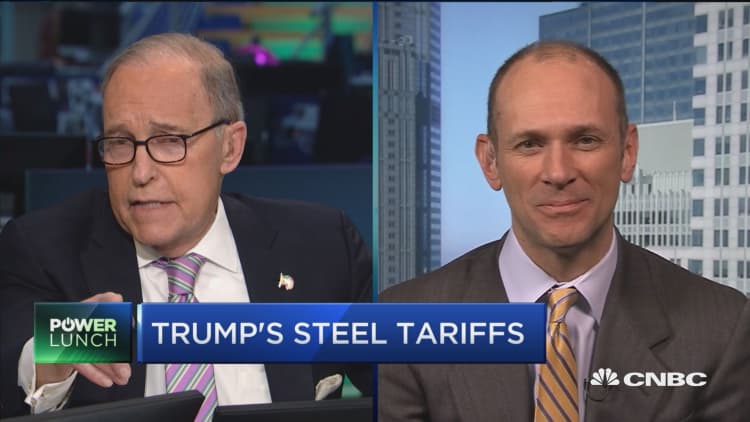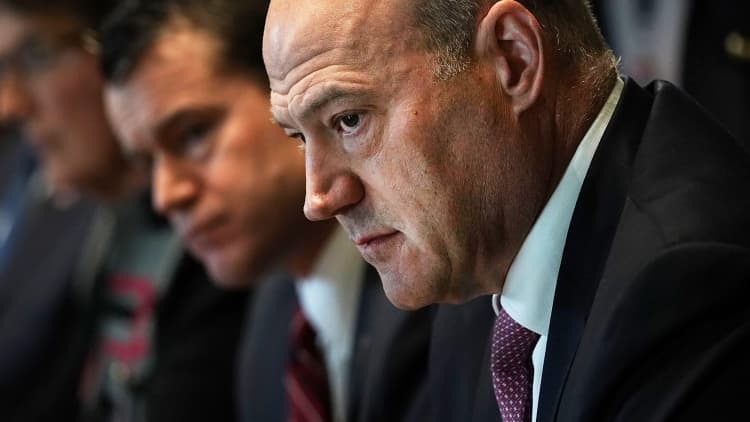
Slapping tariffs on imports may cause more harm than good, Austan Goolsbee, former White House economic advisor, told CNBC on Wednesday.
"It destroys more jobs than it creates," Goolsbee said on "Power Lunch."
Last week President Donald Trump said he plans to place tariffs of 25 percent on steel imports and 10 percent on aluminum imports. Trump has said the tariffs are an attempt to remedy the U.S. trade deficit and fix some of the imbalances in international trade.
But Goolsbee, who was chairman of the Council of Economic Advisors under former President Barack Obama, said isolating specific industries can lead to further problems, such as the possibility of a global recession or trade wars.
"The trade deficit is a large macro thing, determined by monetary policy in the United states, how much investors want to invest here," said Goolsbee, who is now the Robert P. Gwinn professor of economics at the University of Chicago's Booth School of Business. "It's not determined by specific industry trade policy. Protectionism, economic isolation is a terrible thing for the economy."
In fact, he said tariffs might provide a seemingly quick fix by reducing the trade deficit, but will cause other problems, such as manufacturers laying off workers because of a lack of parts.
"I wish President Trump would stop thinking of the deficit as the determinant [in boosting the economy]," Goolsbee said.
CNBC senior contributor Larry Kudlow agreed, and said the trade deficit cannot be linked to specific inefficiencies in various industries.
"The trade deficit is not a reflection of a bad economy," he said on "Power Lunch." "In fact it's the opposite. The only time you get a lower, lower deficit is when we're in recession."
"The trade deficit is the flip side of the capital surplus," said Kudlow, who said he is "puzzled" why certain industries and not others have been targeted with tariffs to reduce the trade deficit.
"I just think the trade deficit is a separate animal all together," he said.
Instead, Kudlow advocates for subsidizing industries to fix imbalances in trade.
"I think that would be more transparent than tariffs," he said.
Later in the day, on CNBC's "Closing Bell," Kudlow said another route to fixing trade imbalances is by implementing targeted tariffs on countries like China, whom he calls "the worst offenders" in unfair trading.
"I don't think the president wants a trade war," Kudlow said. "I think he's sending a signal that he wants to deal with unfair trading practices."
Ultimately, "I think these differences of opinion on trade are bridgeable," he said.
Meanwhile, the S&P 500 and the Dow Jones industrial average both declined sharply Wednesday after Gary Cohn's resignation as White House economic advisor on Tuesday evening. They later regained some ground after the White House hinted Canada and Mexico could be exempt from the tariffs proposed by Trump.
Kudlow said to investors, "Don't panic."
"The market is still suffering from what I would call 'Trade War Jitters,'" he said. "The market is very interested in who comes in to replace Gary Cohn and what their view is, because they want balance between free trade and protection."
Sara Fagen, partner at DDC Public Affairs and a former senior aide to President George W. Bush, told "Power Lunch" that the White House is a stressful place to work and the high turnover rate in the Trump administration shouldn't be concerning.
But she did say that without Cohn, it could mean fewer future proposals and big pieces of legislation, such as the tax proposal, will be on the table.

Kudlow said not to look at the stock market as the "end-all, be-all. But as a barometer of what people are thinking of future business and profits and stocks."


